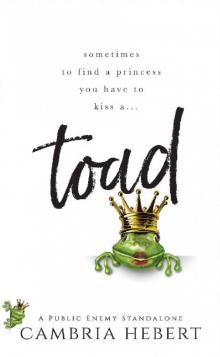- Home
- Cambria Hebert
Amnesia Page 2
Amnesia Read online
Page 2
“It’s just the blankets.”
A quick glance down proved I was covered with blankets. Between suspicious glances at the people crowding my room (there were four), I gazed around, concluding I was in fact in a hospital.
“I don’t understand,” I admitted, all my weight pressing into the bed.
“It’s okay,” the man replied. He was a doctor, with a name badge and a stethoscope. “It’s completely normal and expected to be confused after the ordeal you’ve been through.”
“What ordeal?” I asked instantly, anxiety pressing in on my ribcage.
“We were hoping you could tell us,” the doctor said.
“What?” My brows furrowed.
The nurse leaned close, over the side of the bed. I noticed the railings were pulled up on each side. It made me feel as if I were in jail. Instantly, I hated it and began shoving at the bars, trying to push them down.
“Okay, hang on,” the nurse said and put the rails down. Once it was done, she pinned me with an insistent stare. “You have to stay still. You can’t thrash around. You’ll rip out your IV and reinjure yourself.”
“What happened to me?” I asked for what felt like the fifteenth time. I looked around at the four people in the room, hoping one of them would just spit it out.
The doctor motioned to two of the nurses and then quietly left the room.
I glanced back at the nurse. “Can you tell us your name?” she asked.
“My name?” I nodded once, then opened my mouth… only nothing came out.
Anxiety spiked in me again; I started to become agitated. “I… don’t know.”
“Calm down.” The nurse reminded me.
How dare she tell me to calm down? I couldn’t even remember my name.
Oh my God, I didn’t know my own name!
“I don’t remember!” I gasped, jerking up into a sitting position. “Why can’t I remember?”
Before I could fling the covers off and jump out of bed, the doctor was there, pinning me back down. “If you don’t calm down, we’ll have to sedate you. I don’t want to do that. You’ve been out long enough.”
I stilled. “How long?”
“A while.” The nurse hedged.
I ignored her. She was terrible with questions. “How long?” I demanded.
“A little over two months,” the doctor replied.
I gasped. “What’s my name?” I yelled.
I’d been here for two months and they were asking for my name? Shouldn’t they know it?
The doctor wasn’t looking at me; he was looking at the nurse, giving her a curt nod. She rushed out of the room.
“No!” I shouted. “No drugs! Please! Tell me my name. I just want to know my name.”
“You need to calm down. You’ve had a great deal of trauma, miss.”
I dropped back against the pillow, boneless. He called me miss. “You don’t know my name, do you?” I asked, meek.
Sensing all my energy was drained away, he moved back. A frown pulled at his lips. “You were brought in with no identification.” He began.
Fear unlike anything I’d ever felt wrapped around my heart and squeezed. I searched every corner of my mind for something. Anything.
There was nothing.
“I don’t remember…” I whispered.
The doctor seemed to soften. “I know this must be very scary, to wake up and be so disoriented.”
I laughed, but it wasn’t a humorous sound. I wished I were disoriented right then.
“You’ve been through a lot. Give it a few days. Now that you’re awake, your mind will catch up and you will remember.”
“I will?” I asked.
“There’s a good chance.”
Disappointment speared me. “If I don’t?”
“Let’s take it one day at a time.” He placated me.
“Easy for you to say. You know your name.”
A ghost of a smile appeared on his face. “Time.” He reminded me.
The nurse came through the door, holding a syringe, and I cringed away.
“I don’t think we’re going to need that,” the doctor told her.
I let out an audible sigh.
He glanced around again. “Now that you’re awake, I’ll get you down for testing.”
“What kind of testing?” I asked.
“Routine stuff for someone who’s been in a coma.”
Nothing about this was routine. I was in coma… for two months. And I didn’t even know my name.
When both the nurse and doctor were gone and I was alone, my eyes overflowed with tears and a formidable feeling of dread crowded inside me. The doctor said there was “a good chance” I would remember my name very soon.
The problem was it wasn’t just my name I needed to remember…
It was everything.
Lake living was slow paced, especially small-town lake living. I didn’t mind it much. In fact, I liked it. It was one of the reasons I never left as I’d planned to all those years ago.
Lately, things hadn’t been just slow; they’d pretty much halted. The days were endless, the nights even worse. Inside, I paced all the time, even when my body stood still. It was amazing how exhausting waiting could be.
The store was in top shape, though. Without anything left to do, I put my agitation into organizing and updating the place.
The familiar scent of a brown paper bag wafted up toward my nostrils when I lifted it off the stack and shook it out. The sound it made was also very familiar. After packing the contents from the counter into the bag, I ripped off the receipt and slipped it inside with the purchases.
“Have a good day, Mrs. Grady,” I told the woman as she picked up her stuff.
“Thank you, Eddie. See you next week.”
The second the bell sounded and the door closed behind her, I leaned back against the long counter and rubbed the back of my neck. Just a couple more hours ‘til closing time. By experience, I knew there would likely be a last-minute “rush” of people who were hurrying to get what they needed before I closed for the night and maybe a few travelers getting supplies before heading back to wherever they came from.
After I locked up, I would hit the gym and then swing by the hospital, even though it probably would be the same as the day before.
Against my upper thigh, my cell began to vibrate. Reaching beneath my apron, I fished out the phone, recognizing the number of the hospital. My pulse and breath quickened.
“Yeah?” I said into the phone, sounding as if I’d just left the gym, not just been standing here behind a register.
“It’s Mary Beth,” the woman on the other end said. Her voice was hushed and her words quick.
“What’s happened?” I asked, straightening and glancing at the door. I didn’t bother to tell her she didn’t need to tell me her name when she called.
“She’s awake,” the nurse whispered.
The hand not holding the phone slammed down on the wooden countertop, making a sharp slapping sound. “When?”
“Just a few minutes ago. The doctor’s still with her. She’ll be going for tests if she stays awake.”
“Is something wrong?” I demanded, the words harsh. “Why wouldn’t she?”
“I don’t know. I’m not a doctor.”
“What aren’t you saying?” I ground out anxiously.
“She was very agitated. Screaming her head off.”
Without another word, I leapt over the counter to land on the other side. “I’ll be there in a few.”
“No!” Mary Beth whisper-yelled.
“Why are you even whispering?” I said, moving with intent through one of the aisles toward the back of the store. “You know damn well everyone who heard her screaming is on the phone, loose tongues wagging.”
“They won’t let you back to see her, even if she is awake. The tests and—”
“Thanks for the info, Mary B.” I cut her off. “You’re my favorite nurse at that old stitch shack.”
I heard her begin to laugh, but I cut the connection before she could say anything else. I didn’t care. The door banged against the wall when I shoved into the back room. My apron hit the table, and I snatched my keys off the hook on the wall.
I still had two hours ‘til closing time. I’d already let Brian go home early, something I was regretting right about now.
She’s awake. Finally. It seemed like forever since I’d barged into the ER with her that night, yelling for a doctor and reluctantly surrendering her to a gurney.
At first, they kept me out of her room, claiming I had no right to be there. I wasn’t a relative or next of kin, so it was against policy to allow my admittance.
After a few days of obeying, I stopped. I’d wait until no one was around and sneak into her room undetected. For a few nights at least. One night, I fell asleep in the chair I’d pulled right beside her bed, and the nurse found me.
I’d gotten a stern lecture out in the hall after she dragged me out by my ear, and they told me if I did it again, they’d call the cops.
The cops didn’t scare me. It was pretty much a laughable threat. Hell, I’d gone to school with half the force. Still, I heeded their warnings and instead set up camp in the waiting room down the hall.
After a couple more weeks, the nurses began to soften, as did the doctors. I didn’t know if it was me they softened toward or her. I didn’t care. All I knew was one night, Mary Beth came into the waiting room and motioned me back down the hall.
“She should have somebody,” Mary Beth told me right outside her door. “And you’re the only one…”
I grabbed the handle to let myself inside. Mary Beth grabbed my arm. Her words were gentle. “Eddie. It’s just not possible,” she’d said, not wanting to be cruel, but also trying yet again
to talk sense into me.
I paused mere moments longer, allowing her words to sink in before I started forward again and slipped into the room.
After that night, I visited her every day. Mostly in the evening, but sometimes earlier. I always came when it rained. Always.
The moments I spent in her room were the only ones that didn’t drag since I’d pulled her out of the water. Those were the minutes that ticked by incredibly too fast, speeding toward the time I had to peel myself out of the chair at her bedside and go back to waiting for the next time I was beside her again.
More time passed. She remained unchanged. I went anyway, waiting for this day to come. Waiting for her eyes to open. Waiting for answers.
Back out in the store, I jogged toward the wide, wooden entrance doors and flipped the open sign to closed. We were just going to have to close early tonight. Some of the townies were going to be good and mad, like Scarlet Welding, one of the oldest residents here and definitely one of the spunkiest.
She came in every day before closing to buy herself a fresh green apple. It was her nightly snack with a cup of hot tea. She refused to buy a sack of apples, instead walking to the store each evening to get just one.
With a curse, I raced back inside, grabbed a small paper sack, plucked a plump, shiny green apple off the top of the pile, and dropped it in the bag. On the way past, I snagged a single white rose out of the case and slid it into the sack, a few leaves and the white petals sticking out of the top.
After I closed and locked the doors, I hung the package on the handle. I didn’t worry the apple wouldn’t still be there when she arrived. I knew it would. That’s the way the town of Lake Lochlain was; everyone knew everyone and no one wanted to get in the way of Ms. Scarlet’s nightly apple.
I hurried down the brick sidewalk, past the shops, potted plants, and freestanding chalkboard signs. I didn’t stop to talk to anyone, but remained focused on getting to the small gravel lot at the end of the block where a lot of us town employees parked for the day.
I had no idea what to expect when I got to the hospital. All I knew was finally she was awake.
Silence.
My mind was filled with the kind I found intensely unnerving. Not the kind of silence from the present, but of the past. Currently, my thoughts churned with questions of course.
Why can’t I remember? Who am I? What happened to me? Where is my family? Did I have a family?
Every waking second I had was consumed with trying to understand how I ended up here—wherever that was.
But that was all. There was absolutely no background music in my head. No memories to fall back on when the answers didn’t come. No general wandering of the mind about my favorite color, what kind of food I craved, or even meanderings about my favorite song or the last movie I saw.
It was sort of like staring at a stark-white wall (which this room had plenty of) and waiting for it to mutter a reply.
There was nothing.
I was frightened, but I didn’t know of what exactly. I supposed it would be everything. If I knew nothing, then didn’t I have to fear everything?
I didn’t even know myself to know how I should act right now. What would my “normal” response be to this kind of situation? Was there one?
I had no idea.
The doctors and nurses said my brain just needed time. Time to heal from the injuries, which I was still unclear on, and then everything would come flooding back.
It had been two days since I woke up and couldn’t tell anyone my name. It might not seem like that long in terms of waiting, but when you’re in the middle of a drought, a flood is your savior.
The longer I waited, the more alert I became, the more anxious I grew.
I wanted answers. From the inside of my head and from those around me. I got the distinct impression I was being handled with care, like a piece of fissured glass showing signs of shattering. I didn’t like that feeling, the first actual tangible sense of truth.
Having the staff tiptoe in and out of my room, the hallways going silent when I was wheeled for testing, and receiving sweet smiles of pity—not my thing.
I embraced those surly feelings. Being grumpy was better than being scared. How was I supposed to ever get better if everyone was acting as if I wouldn’t?
I would.
Something became abundantly clear: I was strong. I was a fighter. I didn’t know the full extent of my condition when I was brought in, but to have been in a comma for almost three months and basically had my mind completely wiped and still survive? That made me strong.
So although the stillness in my mind as I searched for something, anything at all, about myself was most certainly unnerving—and so was being in the hospital all alone (why was I alone?)—I would figure it out. Somehow.
The door to my room opened, and the doctor walked in wearing his signature white coat over a set of green scrubs. His gray hair was combed back, his stethoscope around his neck, and he carried a clipboard.
I groaned. “Please tell me I don’t have to look at more flashcards.”
He smiled. “Not a fan of the cards?”
“Maybe if I was in kindergarten,” I said grudgingly.
The doctor laughed. “Ah, should we add sense of humor to your list of traits?” he asked as he pulled up a rolling stool near the bed. He was in here so much (along with a slew of other doctors), they actually just kept the stool in the room.
“I think it’s too soon to tell,” I muttered.
I wouldn’t call what I said humor; it was more like angry sarcasm with a hint of prayer. Since I’d woken, I’d been subjected to test after test and a ginormous pile of flashcards. We spent quite a bit of time holding up cards with pictures on them and me saying what I saw. They weren’t pretty pictures either. It was images of things like a cow, a hamburger, a car, a man, a woman, etc. Basically, the doctors had to figure out the level at which my brain dumped all its info.
So far, I knew everything except any single thing about myself or how I got here.
And my name?
Still didn’t have a clue.
I started telling everyone to call me Amnesia. It’s what I was. Who I was. They all thought I was joking (ah, maybe that was also why the doc wanted to write down sense of humor), but I wasn’t. They had to call me something.
“No flashcards today. I think it’s pretty safe to say you know about the general world around you.”
“So then…?” I asked, wondering what fun new things were waiting.
“I was hoping you could tell me about yesterday,” he said as if we were having a friendly conversation.
“Yesterday?”
He nodded. “What you did, what you ate, who you spoke to. That sort of thing.”
“It should all be there in my chart.” I frowned. “Everything I do here is written down.”
He smiled briefly. “Yes, I’m well aware. I want to hear it from you. It’s so I can ascertain some details about your memory loss. See if you can recall things that have happened since you woke.”
I went through my extremely exciting day yesterday, even adding in the part about not liking bananas. The nurse said they were good, but she lied. Those things were mushy and nasty. I wouldn’t be taking food advice from her again.
For extra bonus points, I added in the details I remembered about right after I woke from my coma. As he listened, he jotted down notes on the top sheet of paper. It was a little strange to realize everything I knew about myself was literally right there in a stack of papers.
How could I have so little sense of self?
“Miss?” the doctor said, and I jerked my head up.
“Amnesia.” I reminded him.
He frowned. “I don’t think that’s a good name. I’ll have one of the nurses bring you a book of baby names and you can choose something for yourself.”
“I like Amnesia,” I rebutted, stubborn.
“Why?” he inquired. He sounded like the head shrink that also came to see me.
Shrugging one shoulder, I replied, “Because it describes who I am. A total loss of memory.”
“You don’t think you’re more than that?”
“Sure, but I haven’t figured out what yet.”
“Do you have the desire to figure out who you are? What your likes and dislikes are?”
Slowly I nodded. It was a daunting task it seemed, but really, what choice did I have? My nose wrinkled. “Why wouldn’t I?”

 #Player
#Player #Hater (Hashtag #2)
#Hater (Hashtag #2) Prince
Prince #Vacay: A #Hashtag and BearPaw Resort Crossover Novella
#Vacay: A #Hashtag and BearPaw Resort Crossover Novella #Fate
#Fate Mr. Fantasy: (A standalone romance)
Mr. Fantasy: (A standalone romance) #Vacay
#Vacay Ivory White : A House of Misfits Standalone
Ivory White : A House of Misfits Standalone 1982: Maneater (Love in the 80s #3)
1982: Maneater (Love in the 80s #3) Moth to a Flame
Moth to a Flame #Blur (The GearShark Series Book 4)
#Blur (The GearShark Series Book 4) Beneath (Heven and Hell #3.5)
Beneath (Heven and Hell #3.5) Blank
Blank Tricks
Tricks #FinishLine (GearShark #5)
#FinishLine (GearShark #5) #Nerd (Hashtag #1)
#Nerd (Hashtag #1) Distant Desires: Part Two
Distant Desires: Part Two Torch (Take It Off)
Torch (Take It Off) #HookUp (Hashtag Series Bonus Scenes)
#HookUp (Hashtag Series Bonus Scenes) Distant Desires: Part 3
Distant Desires: Part 3 Blizzard (BearPaw Resort #2)
Blizzard (BearPaw Resort #2) Amnesty: Amnesia Duet Book 2
Amnesty: Amnesia Duet Book 2 Distant Desires
Distant Desires Heven & Hell Anthology (Heven and Hell)
Heven & Hell Anthology (Heven and Hell) Tattoo
Tattoo Masquerade
Masquerade Charade (Heven & Hell)
Charade (Heven & Hell) Taste
Taste Tirade
Tirade Trashy
Trashy Subzero (BearPaw Resort Book 4)
Subzero (BearPaw Resort Book 4) #Junkie (GearShark #1)
#Junkie (GearShark #1) Avalanche (BearPaw Resort Book 1)
Avalanche (BearPaw Resort Book 1) Frostbite (BearPaw Resort Book 3)
Frostbite (BearPaw Resort Book 3) #Poser
#Poser Tease
Tease #Selfie
#Selfie Avalanche
Avalanche #Rev (GearShark #2)
#Rev (GearShark #2) #Holiday: A Hashtag Series Short Story (Hashtag #6.5)
#Holiday: A Hashtag Series Short Story (Hashtag #6.5) #Bae (The Hashtag Series Book 8)
#Bae (The Hashtag Series Book 8) Charmed (Death Escorts)
Charmed (Death Escorts) Text tio-4
Text tio-4 Taxi (Take It Off #11)
Taxi (Take It Off #11) Toad
Toad #Heart (The Hashtag Series Book 6)
#Heart (The Hashtag Series Book 6) #Heart (Hashtag #6)
#Heart (Hashtag #6) Recalled
Recalled #Swag (GearShark #3)
#Swag (GearShark #3)